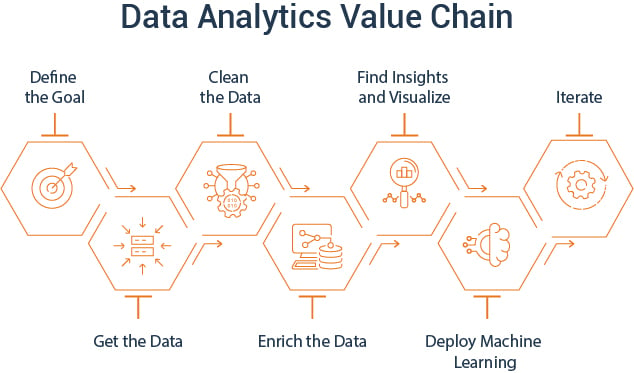Is your organization heavily dependent on a technical team for all your analytics requirements in Microsoft Dynamics 365? Complex business logic can be difficult to understand in any ERP system. Plus, you risk losing valuable time during translation between your technical and business teams.
With an analytics-as-a-service solution, you can get meaningful, combined insights from multiple sources that help answer all your business-critical questions and make data-driven decisions.
To ensure a scalable, flexible analytics foundation, each of your business groups needs secure access and visibility into key business metrics and unified insights from different sources. In addition, you may have industry-specific requirements too. For instance, a manufacturing organization may need insights on metrics for engineering change management or an end-to-end value chain for rental industries.
Your ERP solution alone cannot help. So, how do you make the most of your ERP data quickly?
Analytics-as-a-service solution for your ERP can solve that for you. It can give you a head start on your business intelligence strategy by providing meaningful analysis of your business data across departments and roles, with little to no external support.
At To-Increase, we help organizations transform their data into meaningful business insights and accelerate their analytics journey with pre-packaged, industry-leading solutions—Business Analytics Suite.
Improved process efficiency and accelerated time-to-value are among the many benefits you can gain with a pre-packaged analytics solution for your ERP. In this blog, we share the top 5 benefits of analytics-as-a-service for your ERP.
Benefits of an analytics-as-a-service solution
Pre-packaged analytics can enhance your ERP operations overall, but most importantly, it enables you to maximize the value of your data. Here are the reasons why you should consider an analytics-as-a-service solution to sharpen your decision-making.
1. Accelerate speed to analytics
Implementing end-to-end analytics involves multiple steps such as data preparation, extraction, modeling, and visualization. Considering the multiple steps involved, this can be time-consuming and expensive. With a pre-built analytics package, you can gain insights into data from different functions and industries, in no time, with minimal effort from your internal IT and BI teams.
It comes with interactive visualization tools with role-specific access to diverse levels of business users. Depending on your access level, it allows you to look through data analytics reports quickly and share your conclusions in the form of interactive dashboards across your organization.

2. Leverage department and industry-tailored solution
Analytics-as-a-service solutions come with pre-configured analytics, including metrics, reports, and dashboards for various domains and industries. These are typically created based on deep industry expertise and in collaboration with multiple customers and partners. This makes the output industry-leading and best in class.
The complex steps such as data cleaning, modeling, and transformations are all built-in. Therefore, the out-of-the-box configurations can be extended to tailor it specifically to your business needs with ease of point and click.
3. Combine insights from multiple sources with your ERP data
A pre-built analytics solution can combine insights from not only your ERP but also your CRM, legacy business systems, financial systems, and third-party applications. It offers a comprehensive data repository architecture that enables uniform handling of data from multiple sources. Also, with managed processes in place, it is easier to handle a large number of information sources distributed over multiple systems.
Pre-packaged analytics supports an integrated data model that can help you create a unified data model across all departments. It further helps bridge the gap between analytical and operational applications, improving data consistency and maximizing business value.
4. Establish a data-driven culture
A pre-built analytics solution can be easily embedded into a variety of landscape applications, such as Microsoft Teams, Power Apps, SharePoint, etc. With insights at their fingertips, users are enabled to drive action in alignment with your key business goals. Moreover, extending pre-built analytics to fulfill specific needs has become simplified with user-friendly visualization tools such as Power BI, Tableau, QlikView, Excel, Zoho Analytics, etc.
Analytics-as-a-service simplifies business logic and offers pre-built capabilities. The key business metrics, best practices, and leading indicators for industries are readily available to help you reach your business goals. Here’s what that leads to:
- Your employees are better equipped to make the right decisions at the right time driven by real, meaningful data
- Your organization is prepared to establish and kick-start analytics in no time
5. Save time and effort in managing and maintaining data
Once your analytics and business intelligence solutions are up and running, the journey isn't over. The Finance and Supply Chain software is updated every month typically with new features, functionality, and changes to the current state. Modifications in the software entail updating analytics as well. This requires a cross-functional skill set of people—ERP specialists, functional users, and business users—to come together to evaluate changes and agree on the updates. This is time-taking and tedious.
With an analytics-as-a-service solution, you can reduce time and effort. A study shows that companies using packaged analytics solutions spend 35% less per BI user than those that do not.
Should I consider analytics-as-a-service for my ERP?
With an array of meaningful benefits that analytics-as-a-service can offer your ERP, considering it during your analytics implementation can help you save time and money.
A pre-packaged analytics solution includes all the elements of a robust business intelligence tool, such as:
- Ready-to-use templates for insights specific to a department or industry
- Extendibility and flexibility to customize the solution to your needs
- A foundational framework for advanced and predictive analytics
- BI and analytics best practices to manage data from multiple sources
- End-to-end analytics, including data preparation, extraction, modeling, and visualization
A pre-built analytics solution provider uses industry best practices to offer all these elements together much faster than if you were to build it from scratch. Therefore, if you want to gain quick, actionable insights from your ERP data and maximize its true value, an analytics-as-a-service software solution is the right way forward.





